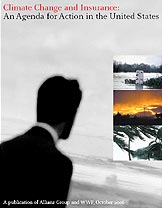Insurance industry needs to do more to fight global warming
Insurance industry needs to do more to fight global warming
mongabay.com
October 13, 2006
The insurance industry needs to do more to address the growing impact of climate-change induced damaged according to a report issued this week by insurance giant Allianz and environmental group WWF.
The study, titled “Climate Change and Insurance: An Agenda for Action in the United States”, examines the potential impact of increased flooding, forest fires, and storm damage — particularly hurricanes — expected in a warmer future. “Climate Change and Insurance” notes that “these changes could make insurance unaffordable for customers in high-risk areas… and in some cases, insurers are [already] exiting these markets altogether.”
Allianz says that insurance industry must work with governments and regulators to better manage the risks associated with climate change.
 . |
“We need to better understand the effects of climate change and the changing environment for our customers,” says Clement Booth, member of the Board of Allianz AG, “but if we can find a way to provide insurance in the face of major changes, from the first transatlantic voyages to global terrorism, then we can also find new ways to both incentivize emission reductions and provide coverage.”
“Global warming is the greatest environmental threat facing the world, and the people and animals that inhabit it. The cost of doing nothing carries a price tag none of us can afford,” says Carter Roberts, President and CEO of WWF-US. “The insurance industry has a vested interest in stepping up to the plate and being a part of the solution.”
The report lays out several recommendations for addressing the potential consequences of climate change in the United States including correcting market distortions that under price risk in certain markets (i.e. the National Flood Insurance Program); incorporating forecasted future potential climate change impacts into planning, rather than relying only on historical data of past weather events; promoting storm-resistant and energy-efficient building construction; and discouraging development in high-risk areas like coastal mangrove forests. Allianz says it plans to provide insurance policy discounts customers who adopt green building techniques (i.e. LEED and Green Globes certified buildings) to save energy and reduce emissions of greenhouse gases.
“Energy-efficient construction can also help make buildings and homes more resilient; double pane windows are less likely to shatter during fires, for instance,” said Chuck Kavitsky, chief executive officer of Fireman’s Fund, a unit of Allianz. “A lot of building owners are concerned about climate change but don’t know what to do. Here’s one thing building owners can do that addresses more than their bottom line.”
Allianz says it intends to cut its own greenhouse gas emission by 20 percent by 2012.
Climate Change and Insurance: An Agenda for Action in the United States (pdf, 13MB)
This article is based on a news release from Allianz.